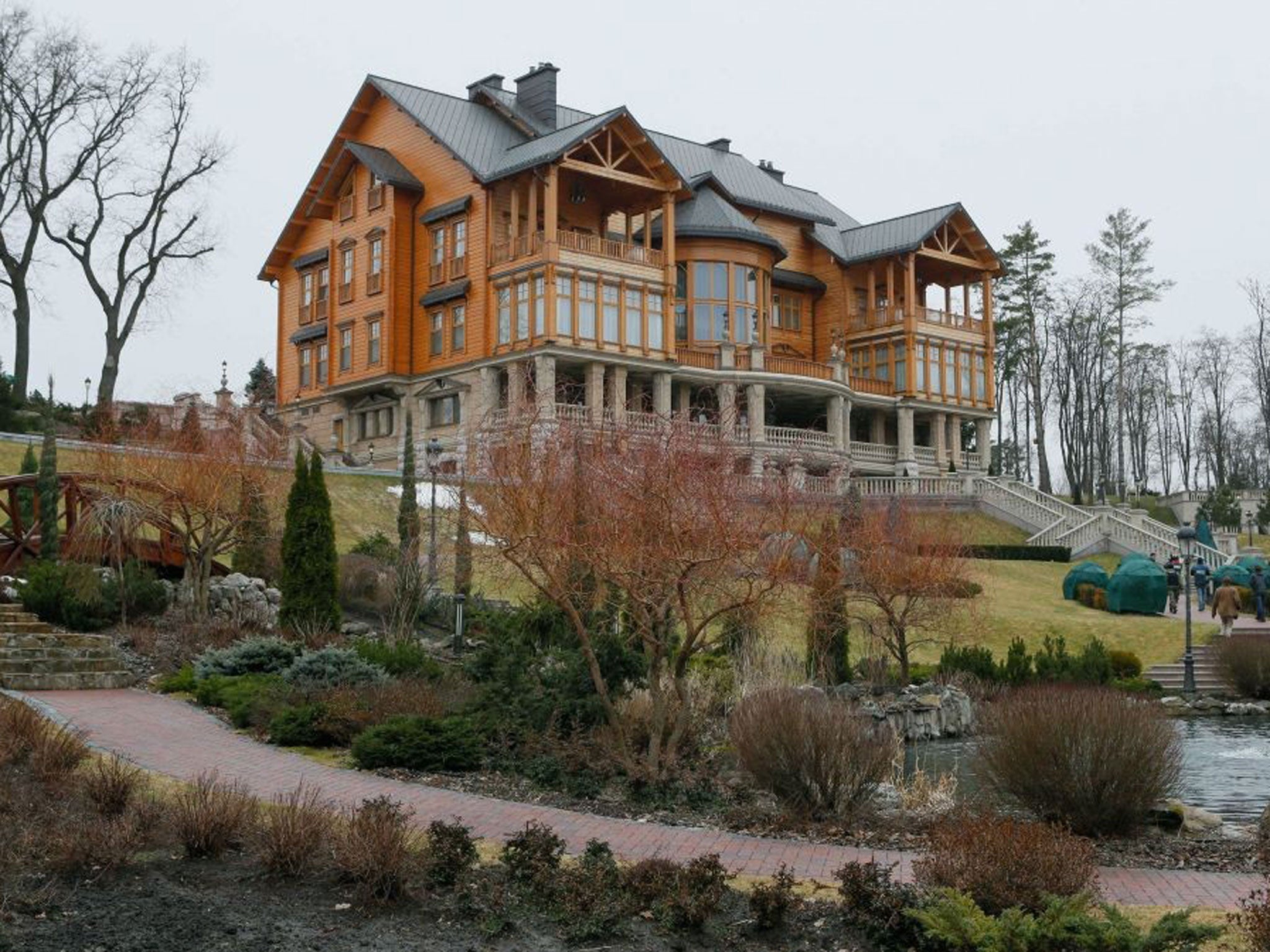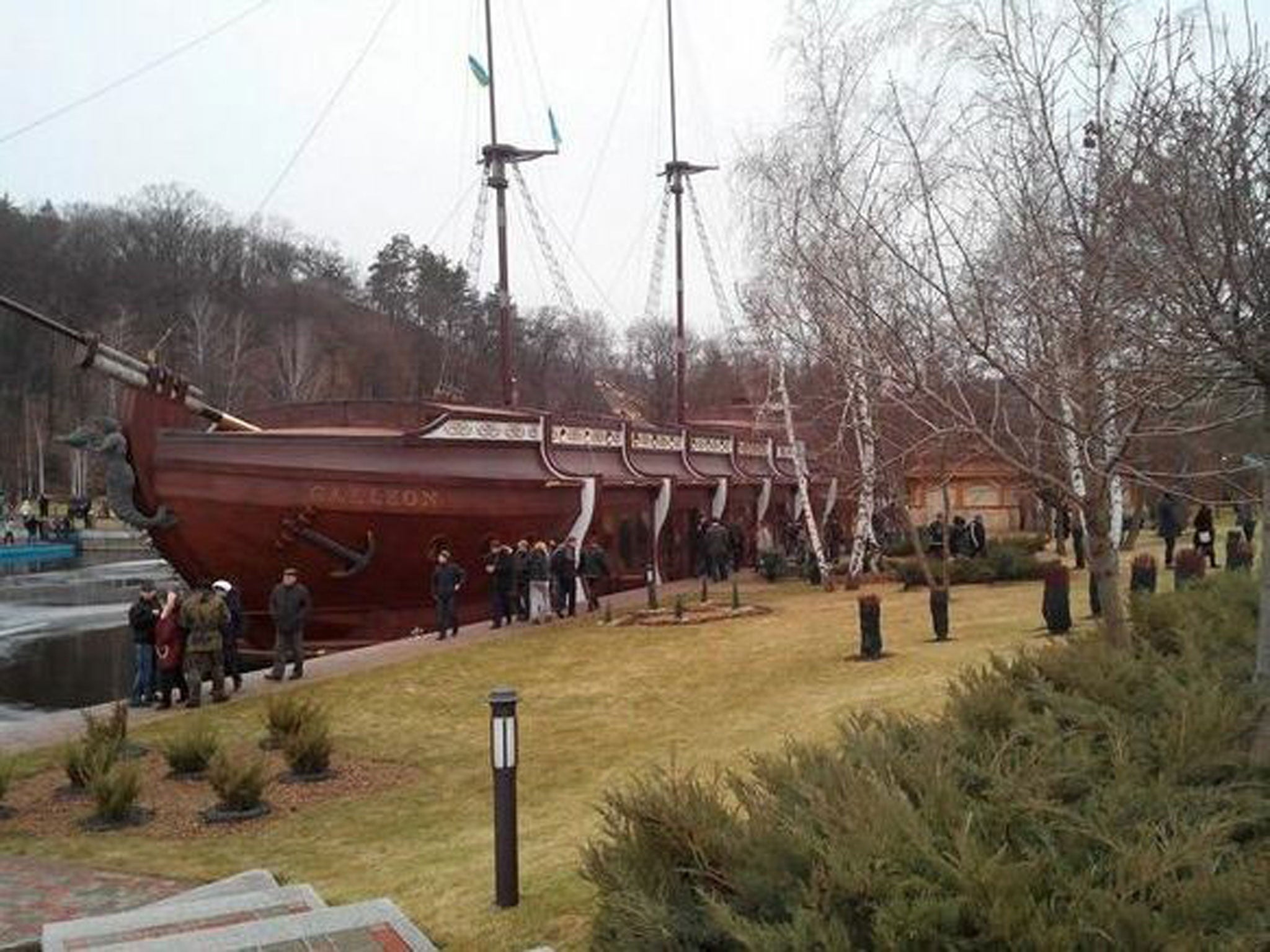Ukraine uprising: The private zoo, the galleon moored on a private lake, the fleet of vintage cars - Ukrainians left open-mouthed at the opulence of Yanukovych's country estate
It's a kleptocratic state with no independent judiciary where one in four lives in poverty. No wonder they've had enough

It was the expressions on the faces of the everyday Ukrainians that stayed in the mind. As the crowds flung aside the gates and flooded into President Yanukovych's country estate, they were left open-mouthed at the scale of the opulence uncovered.
It was not just the size of it; so big, in fact, that many reported walking around for hours but still seeing only a fraction of the grounds.
Nor the private zoo, complete with its own peacocks. Or the faux galleon permanently moored on his private lake. Or the fleet of vintage cars. Or the motorcycle collection. It was the fact that they had never imagined anything like this even existed.
Every Ukrainian knows the country has a corruption problem. It is impossible not to. You can barely visit, let alone try to do business there, without at some point realising a bribe is expected. But until able to see for themselves the luxury that those at the top had bought with the money they had skimmed off, few could conceive the scale of the theft undertaken.
The average daily wage in Ukraine is £8. In a number of regions, it is barely £5. More than a quarter of the population lives below the poverty line. It has the most severe HIV epidemic in Europe. Millions lack adequate health and social care.
It did not have to be like this. Blessed with natural resources, a benign climate across much of its southern regions, an educated workforce and access to the Black Sea, this should be a wealthy country. In 1992, after the Soviet empire had imploded, its economy was roughly the size of that of its neighbour Poland. Now it is half its size.
Latest:
Country is descending into a chaos of warring extremist groups
EU aims to woo new leadership with aid deal
Comment: Too simple to describe this as a case of East vs West
Putin promises to work with Merkel and keep crisis-hit country ‘intact’
The reason why is largely due to the kleptocratic state that has been formed there. Forbes magazine reported that Yanukovych's own son, a dentist, won 50 per cent of all state contracts last month, which one commentator called "possibly the biggest dental extraction in history". There is no independent judiciary.
After yesterday's tumultuous events, what happens next is uncertain. There are certainly worrying signs that the country could tear itself apart. In the Crimea, demonstrators were on the streets demanding unification with Russia, which keeps a vast fleet in Sebastopol – just as their counterparts in Kiev were celebrating while storming Yanukovych's country compound.
But it would be wrong to read what is happening as some inevitable fault line between rival ethnic groups, with the eastern-based "Russians" versus the western-based "Ukrainians". From its start in November, this has been a conflict not about geography but about ideology – and exactly what type of country its people want Ukraine to be.
On the one side are those who want a robust legal system, a fairer economy, an engagement with the wider Western world and a more democratic rather than autocratic political system.
On the other are those who have, or fear they have, the most to lose: the political elites and those who got rich off Ukraine's pickings. There are also those who worry that competition could result in economic reforms which would wreck their livelihoods or who – not least due to the government's propaganda – fear that anarchy beckons.
Ukraine has a blood-soaked history. Knowing just how bad things can get when things go wrong is an understandable incentive to back a government that promises strength and stability, even if, in practice, it delivers neither of those things.
Many in this anti-reform camp are in the eastern part of the country, with its greater proximity to, and therefore economic interdependency with, Vladimir Putin's Russia. But not all of those living in this region are regime supporters, and it has suffered just as much economic hardship as the rest of the country. Equally, there are many in the west who support the old regime.
What is certain, however, is that, despite yesterday's public protestations, Yanukovych must quickly accept what is now inevitable if things are not to get even worse. His day as leader of a united state is done, though the knowledge that he and his family face not only the loss of much of their wealth but possible imprisonment may prevent him acknowledging that fact.
The freeing of Yulia Tymoshenko, who remains popular despite the corruption rumours that also surround her, provides a potential figurehead for the opposition. The ex-boxer Vitali Klitschko has emerged as another viable leader, one untainted by the scandals and political machinations of the past.

Yet the most important development yesterday may not be Tymoshenko's release, or even Yanukovych's departure from Kiev, but the one signalled by that look of amazement on the faces of those people at the President's country compound. They now know and, indeed, all Ukrainians now know, exactly the scale of the exploitation that was being undertaken.
Whoever comes next will not be able to allow business to continue as usual. The reality of what was going on has been exposed and, therefore, unlike the opulent but static galleon in Viktor Yanukovych's lake, the country can finally change course.
The key players
Yulia Tymoshenko, 53
The former energy company boss was a leader of the 2004 Orange Revolution after Viktor Yanukovych's election as president. She was prime minister in 2005 and from 2007 to 2010. Given a seven-year prison sentence for abuse of office in 2011, she was freed yesterday.
Vitali Klitschko, 42
"Dr Ironfist" is the WBC world heavyweight "champion emeritus" and leader of the opposition Udar party. He told demonstrators he was prepared to "fight" and "face bullets".
Oleksandr Turchynov, 49
This senior member of the opposition Fatherland Party, writer and Tymoshenko ally was elected speaker of the national parliament yesterday.
Arsen Avakov, 50
Former head of the Kharkiv state government was arrested for an illegal land transfer in 2012. The Tymoshenko ally was elected to parliament in 2012 and appointed interim interior minister yesterday.
Arseniy Yatsenyuk, 39
The economist, lawyer and leader of the Fatherland party in parliament turned down an offer to become prime minister in January, but there are rumours that he might now take the post on an interim basis.
Join our commenting forum
Join thought-provoking conversations, follow other Independent readers and see their replies
Comments